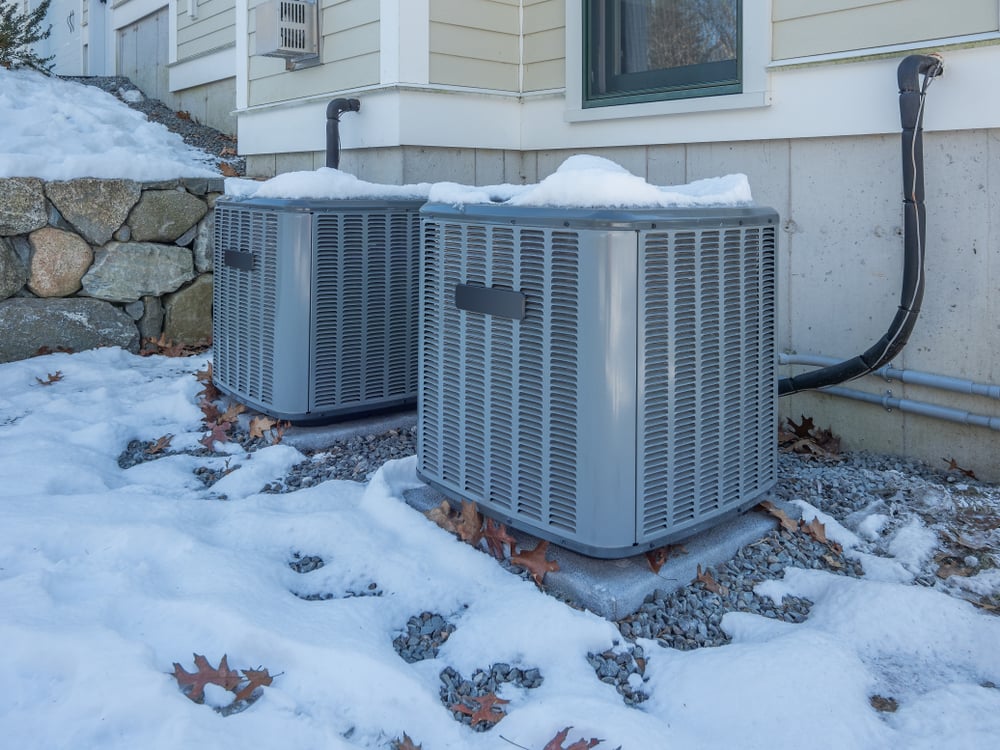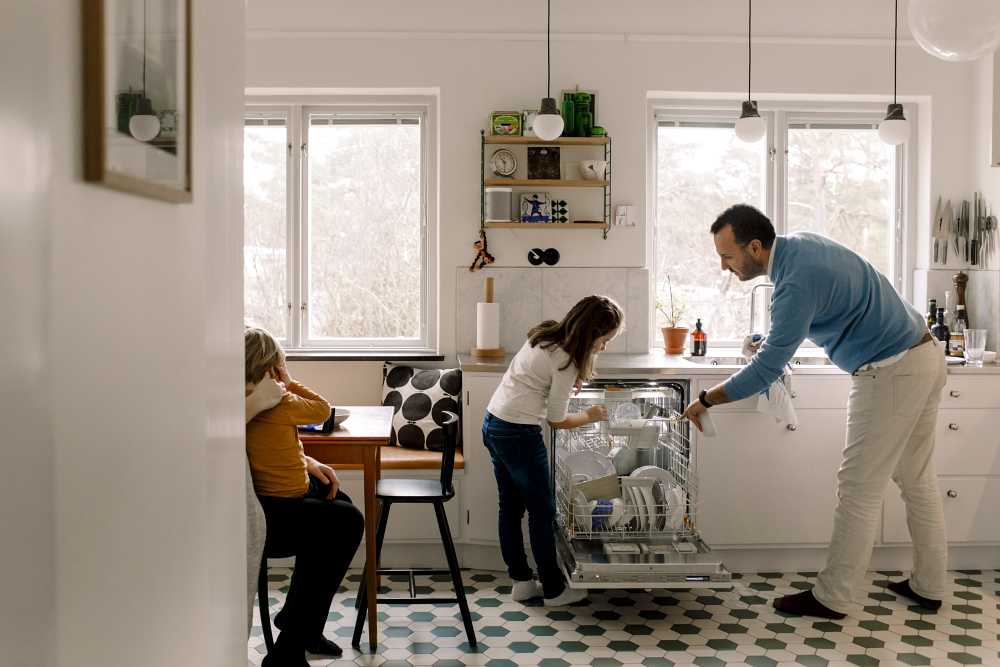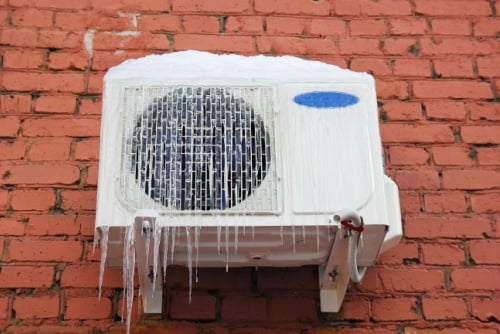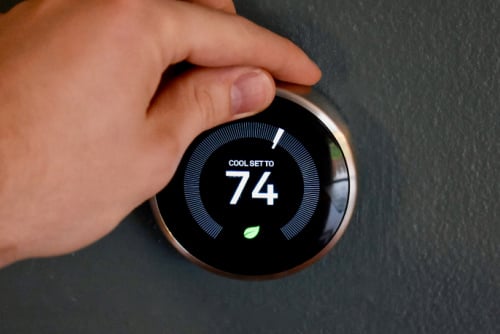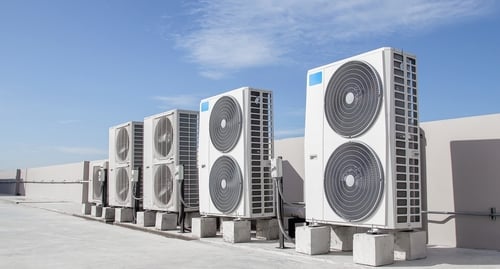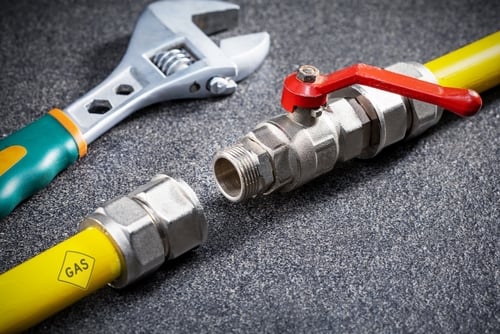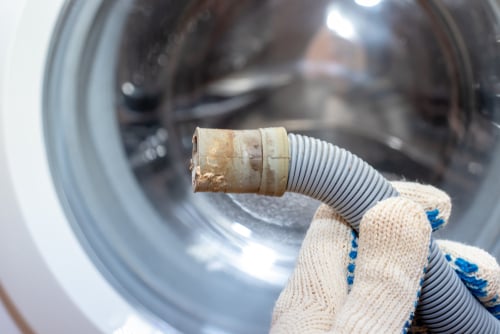As days grow shorter and temperatures drop, we start relying on our trusty HVAC systems to keep our homes cozy and comfortable. It’s important to set aside a little time for heating system maintenance to ensure you have a joyful holiday season.
We reached out to one of our Frontdoor Experts, Micah Sherman, to provide a HVAC maintenance checklist. Having learned from his father, he has been working on HVACs since high school with over 10 years of experience, and also has his certifications for HVAC schooling and EPA license.
HVAC Maintenance Checklist
1. How can I Assess the Current Condition of my Heating, Ventilation, and Air Conditioning System to Ensure it is Ready for Winter?
The following steps can help you assess your HVAC system’s readiness for winter and prevent issues before the colder months arrive.
- Visual Inspection: Check for visible damage or signs of wear and tear in the HVAC components, such as the furnace, air conditioner, and ductwork.
- Thermostat Check: Test your thermostat to make sure it's working correctly and consider upgrading to a programmable or smart thermostat for better control.
- Test Heating Function: Turn on your heating system and ensure it produces warm air consistently. Listen for unusual noises.
- Inspect Insulation: Check the insulation in your home, especially in the attic and walls, to prevent heat loss.
- Carbon Monoxide Detector: Ensure your carbon monoxide detectors are working correctly, as heating systems can produce this dangerous gas.
Emergency Plan: Have a plan in case of heating system failure, such as access to alternative heating sources, and be sure to have the Frontdoor App downloaded so we can help you via video chat.
2. What Is the Ideal Temperature Setting During Winter to Balance Comfort and Energy Efficiency?
While You're at Home: Set your thermostat to a comfortable temperature, typically between 68°F (20°C) and 72°F (22°C). Adjust it to your preference within this range. Wear warm clothing like sweaters and use blankets to stay cozy.
While You're Sleeping: Lower the thermostat by a few degrees. Many people find a nighttime temperature of around 60-65°F (15-18°C) provides the best night’s sleep. Using extra blankets can help keep you warm.
While You're Away: Consider setting the thermostat lower to save energy. Some programmable or smart thermostats allow you to schedule temperature adjustments based on your daily routine. Smart thermostats allow you to make changes remotely in case you forget before leaving the house. Also, you can change the temperature to your at-home preference before you return.
Humidity Matters: The humidity in the home (or the lack thereof) can drastically change our comfort level. Consider adding a humidifier to the HVAC system or the rooms you spend the most time in and fill it with distilled water if you notice if the home feels too dry.
3. Are There Any Recommended Maintenance Tasks I Should Perform Regularly for Winter Readiness?
Yes, there are several maintenance tasks you should perform annually to ensure your system is ready for winter. Proper HVAC maintenance helps improve energy efficiency, ensures consistent heating, and reduces the risk of breakdowns during the colder months.
Here's a checklist of essential HVAC maintenance tasks for winter readiness:
- Change or Clean Air Filters: Replace or clean your HVAC system's air filters every 1 to 3 months, depending on the type of filter and usage. Dirty filters restrict airflow, reducing heating efficiency.
- Seal Leaks: Inspect doors, windows, and any openings for drafts. Seal gaps and cracks with weatherstripping or caulking to prevent heat loss.
- Clean Vents and Registers: Remove dust and debris from vents and registers to ensure unobstructed airflow and even heating distribution.
- Inspect Ductwork: Check for leaks or damage in your ductwork. Seal any gaps with duct tape or mastic sealant to prevent heated air from escaping.
- Clear Air Supply Vents: Ensure that furniture and other items do not block air supply vents in your home to maintain proper airflow.
- Clean Around Outdoor Unit: If you have an outdoor unit (e.g., for central air conditioning or heat pumps), clear debris and leaves from around it to maintain efficient operation.
- Check for Unusual Noises: Listen for unusual sounds coming from your HVAC system, such as rattling, banging, or grinding. These can be signs of issues that need attention.
- Schedule Professional Maintenance: Arrange for a Pro HVAC technician to perform a comprehensive system inspection and maintenance service. They can clean components, lubricate moving parts, and identify potential problems. Experts at Frontdoor will gladly assist you via video chat if you would like to perform this maintenance yourself!
- Inspect and Clean Condensate Lines: If your HVAC system has condensate lines, check for clogs or blockages. Clean or clear them to prevent backups and potential water damage.
- Replace Aging Systems: If your HVAC system is old and inefficient, consider upgrading to a newer, more energy-efficient model to save on heating costs.
- Install a Programmable Thermostat: Consider installing a programmable or smart thermostat to automate temperature adjustments for energy savings.
4. How Often Should I Replace the Air Filters During Winter Months?
During the winter, you should generally replace or clean your air filters every 1 to 3 months. However, the specific frequency can vary depending on several factors:
- Type of Filter: The type of air filter you use matters. Standard fiberglass filters typically need replacement every 1 to 2 months. High-efficiency filters, like HEPA or MERV-rated filters, can often last 3 months or more.
- Usage: If you use your HVAC system more frequently during the winter—for example, in very cold climates where heating is essential—you may need to change the filter more often.
- Allergies and Pets: If you or your family members have allergies or asthma, or if you have pets, you might want to replace filters more frequently. Pet dander, fur, and other allergens can clog filters faster.
- Indoor Air Quality: If you're concerned about indoor air quality or have pollutants like smoke or dust in your home, consider changing the filter more frequently to maintain cleaner air.
5. How Can I Ensure the Ductwork is in Good Shape to Prevent Heat Loss or Airflow Problems?
Ensuring that your ductwork is in good shape is essential for preventing heat loss and maintaining efficient airflow, especially during the winter. Here's how you can check and maintain your ductwork:
Visual Inspection: Start with a visual inspection of your ductwork. Look for any visible signs of damage, such as cracks, gaps, loose connections, or disconnected sections.
Pay attention to joints, seams, and connections, as these are common areas where ducts can develop leaks.
Seal Leaks: Use duct sealant (also called mastic) or foil tape to seal any visible gaps or leaks in the ductwork. Avoid using duct tape, as it tends to deteriorate over time.
Focus on sealing joints and connections where air can escape. Make sure the sealant is applied evenly and covers the entire area.
Insulate Ducts: Insulate ducts that run through unconditioned spaces, such as attics, crawlspaces, or basements. Insulation helps prevent heat loss (or gain) as air travels through the ducts.
Ensure that the insulation is in good condition and not damaged.
Check for Obstructions: Ensure that ducts are free of obstructions such as debris, pests, or insulation material that may have fallen into the ductwork.
Clear any obstructions to maintain proper airflow.
Balancing Dampers: If your duct system has balancing dampers, make sure they are adjusted correctly to ensure balanced airflow to different areas of your home.
If you’d like help inspecting your ductwork, give us a call on the Frontdoor app and our HVAC Experts will gladly help you identify any issues with your ductwork, and help fix it together. Reach out on the app today to schedule a video chat!
6. Are There Any Energy-Efficient Upgrades I Should Consider Before Winter?
Yes, there are several energy-efficient upgrades you should consider before winter to improve comfort, reduce energy consumption, and lower your heating costs.
Here are some worthwhile upgrades:
- Programmable or Smart Thermostat: Upgrading to a programmable or smart thermostat allows you to set temperature schedules and remotely control your HVAC system. Some smart thermostats have occupancy sensors that can help reduce energy consumption. This can help you optimize heating times and reduce energy use when you're not at home.
- Sealing and Insulating Ductwork: Leaky or uninsulated ducts can lead to heat loss and reduced system efficiency. Sealing gaps and insulating ducts in unconditioned spaces like attics or crawl spaces can improve overall system performance.
- High-Efficiency Air Filters: Choose high-efficiency air filters with a MERV (Minimum Efficiency Reporting Value) rating appropriate for your system. They can capture more particles and improve indoor air quality without significantly impacting airflow.
- Zoning System: Installing a zoning system allows you to heat different areas of your home independently. This is particularly useful if you have rooms that are rarely used, as you can reduce heating in those spaces.
- Energy-Efficient Furnace or Heat Pump: If your HVAC system is outdated, consider upgrading to a more energy-efficient model. Look for units with a high AFUE (Annual Fuel Utilization Efficiency) rating for furnaces or a high HSPF (Heating Seasonal Performance Factor) rating for heat pumps.
- Proper Insulation: Ensure your home is well-insulated, especially in attics and walls. Proper insulation reduces heat loss, making it easier for your HVAC system to maintain a comfortable temperature.
- Storm Windows and Weatherstripping: Installing storm windows and adding weatherstripping to doors and windows can help reduce drafts and heat loss.
- Regular HVAC Maintenance: Regular maintenance is essential to keep your system operating efficiently.
7. Are There any Potential Safety Hazards Associated with my HVAC System that I Should be Aware of During Winter?
Yes, there are several potential safety hazards associated with HVAC systems. Taking preventive measures and staying vigilant can help ensure your safety. Here are some common safety concerns:
Carbon Monoxide (CO) Poisoning: HVAC systems, especially furnaces, can produce carbon monoxide gas, which is colorless, odorless, and potentially lethal.
Install carbon monoxide detectors in your home and test them regularly. Make sure there is one on every level of the home, especially near bedrooms and sleeping areas.
Carbon monoxide detectors don't last forever, they do expire. Over time, the components inside the detector degrade. The average lifespan is seven years, and you should try to replace yours every five years. You can locate the expiration date on the back of the device.
Schedule annual HVAC maintenance to ensure proper combustion and venting of exhaust gases.
Gas Leaks: If you have a gas furnace, there's a risk of gas leaks. If you smell gas (a rotten egg odor), immediately evacuate your home and call your gas company and emergency services. Do not flip any switches in the home on the way out.
Regular HVAC maintenance includes checking for gas leaks.
Fire Hazards: Older or poorly maintained furnaces may pose a fire risk. Dust and debris can accumulate in or around the unit, increasing the potential for fires.
Keep the area around your furnace clean and free of flammable materials.
Electrical Hazards: Faulty wiring or electrical components in HVAC systems can lead to electrical fires.
Ensure your HVAC system is professionally installed and regularly inspected for electrical issues.
Frozen Pipes: In extremely cold weather, the condensate drain line or other pipes connected to your HVAC system can freeze and potentially burst.
Insulate pipes and ensure proper drainage to prevent freezing
Poor Indoor Air Quality: A dirty or poorly maintained HVAC system can lead to poor indoor air quality, exacerbating respiratory issues or causing discomfort.
Regularly change air filters and schedule HVAC maintenance to keep the system clean.
Ventilation Issues: Blocked or poorly functioning ventilation can lead to indoor air pollution and inadequate airflow.
Ensure that vents, registers, and ducts are not obstructed, and have your ductwork inspected for blockages or leaks.
Ice and Snow Buildup: Ice and snow can accumulate on the outdoor unit of heat pumps or condensing furnaces, affecting their operation. Regularly clear away snow and ice if necessary.
Keep ice and snow away from the gas meter. If it gets covered with snow, it could lead to a service interruption, or a gas leak, which could cause a fire or even explosion. Carefully shovel snow away from the meter and any associated piping.
Propane or Oil Tank Safety: If you use propane or oil for heating, ensure tanks are inspected, properly maintained, and free from leaks.
Check your tank to make sure you have enough fuel. Even if you have a contract with a delivery company, you will still need to walk to the tank and see how much fuel you have, and have it re-filled before it runs out.
8. How Often do you Recommend Regular Maintenance to Ensure my HVAC System Remains in Top Condition?
To ensure your HVAC system remains in top condition and operates efficiently, it is generally recommended to schedule regular maintenance at least once a year, preferably twice a year in the spring and fall. However, the specific maintenance schedule can vary depending on factors such as the type of HVAC system you have and your climate. Here are some general guidelines:
Furnaces (Gas or Oil): It's advisable to have a Pro HVAC technician inspect and maintain your furnace annually, preferably before the heating season begins in the fall. This ensures that the system is in good working order and safe for operation.
Heat Pumps: Heat pumps provide both heating and cooling. It's a good idea to schedule maintenance once a year, ideally in the spring or early fall, to prepare the system for the upcoming heating or cooling season.
Air Conditioners: Air conditioning systems should also be inspected and serviced annually, typically in the spring before the cooling season begins.
Ductless Mini-Split Systems: These systems benefit from annual maintenance, ideally in the spring or early fall, to ensure efficient heating and cooling.
Boilers: Boiler systems should be professionally maintained once a year, usually before the heating season begins. This includes checking the boiler's efficiency and safety features.
We at Frontdoor would love to assist you in performing maintenance on your HVAC system so you are well prepared for winter! Download the Frontdoor App today and video chat one of our Experts to learn more about proper HVAC Maintenance.
Was this article helpful?
